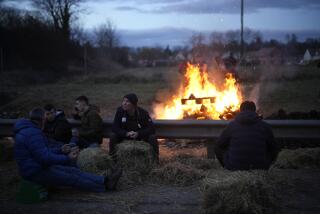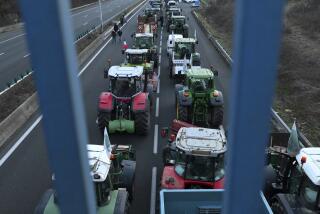Garden-Variety Revolt : Small Farmers in Russia Seek to Root Out Once-Tolerated Potato Poachers
- Share via
KRASNOGORSK, Russia — It’s harvest time in Russia, and for Uncle Kolya it is an unhappy one.
Digging in the fields by hand is tedious, back-breaking work, but that is not really Kolya’s complaint. Nor does his foul mood result from a drought that augurs the poorest national grain crop in three decades.
Kolya is a struggling potato thief. The root of his problem is a “garden revolution” in rural Russia. His easiest victim, the collective farm system, is in deep decline, while the tens of millions of individuals now growing their own food no longer tolerate parasites like him.
Scraping to survive on garden-sized plots, these growers have declared class war on him. Knocked him unconscious. Cracked his ribs. Seized his most useful possession--a bicycle.
But the likes of Uncle Kolya, a 56-year-old alcoholic who doesn’t want you to know his last name, appear to be multiplying like pests as the squeeze on Soviet-era subsidies puts more and more people out of work.
Compared to racketeering, murder-for-hire and other forms of organized crime that plague Russian cities, potato poaching is so petty and disorganized that police seldom react to it or even bother to record it.
But the practice is setting Russia’s new garden farmers against the new jobless poor in an increasingly ugly conflict, according to recent tales from scattered towns and villages. This summer’s annals of rural crime and punishment have an unusual edge of violent, and even deadly, vigilantism.
At least three poachers have been reported killed, including one beaten to death near the Ural Mountains town of Nizhny Tagil by an elderly couple who, police said, feared they would not live through the winter without their home-grown spuds. Other thieves have been ambushed with hunting rifles.
Poachers caught in the Yaroslavl and Rybinsk regions have been stripped of their clothing, tied to trees and flogged with ropes by their victims, then left in naked bondage by the roadside, men and women alike, often with only their faces covered.
In his confessions of a potato thief, Kolya reports that three men caught him in this rural district northwest of Moscow with half a bucket of potatoes from a private garden “and kicked me as if I were a fascist or something” until he passed out with two broken ribs.
He wasn’t back in action long before suffering a costlier setback. “A guy with a huge sheep dog caught me in his garden,” Kolya said, portraying himself again as the victim. “He didn’t beat me or even sic his dog on me, but he took my bicycle. The pig! It was daylight robbery!”
*
The bicycle is the lowly thief’s potato hauler and getaway vehicle of choice; with a head start, it can usually outpace a victim pursuing on foot down a country road or forest trail. Sophisticated poachers use motorcycles.
Near the Urals city of Yekaterinburg, an army officer spotted thieves loading potatoes from his garden into a motorcycle sidecar, dashed to an army base and drove back in a troop transport truck. With the heavy army truck, he rolled over the cycle a few times, crushing it, potatoes and all, as the terrified thieves fled on foot.
Soviet collective farming bred a cynicism that encouraged massive theft from the state.
Faced with labor shortages on the collective farms, Soviet authorities in 1990 lured tens of thousands of Muscovites to dig up potatoes that otherwise would have rotted in rain-soaked fields outside the capital. As incentive, city folk were allowed one sack of potatoes for every four they gathered for the state. Then, after the harvest was officially over, anyone was free to come pick and keep any potatoes still in the ground.
With that, the line between potato poaching and private initiative was so blurred that digging up potatoes planted by someone else became, to many a Russian soul, virtually the same as gathering wild mushrooms in a forest.
What has turned poaching from a harmless, socially tolerated practice into an act of class warfare is the garden revolution.
Soviet-style collective farms, subsidized by the state at huge cost, are failing but still grow Russia’s grain and account for more than half of agricultural output overall. Legal and financial obstacles have frustrated the market reformers’ goal of supplanting collectives with big private farms.
Instead, the fastest growth in rural Russia is in gardens, many no bigger than the average American suburban lot. Plots have been leased or given away by state enterprises and labor unions to 22 million of Russia’s 50 million households in the past decade; 9 million families have received such uchastki in the past three years alone.
Some gardens are at suburban dachas , or cottages, but most are subdivisions of old communal fields. Offsetting the decline of the inefficient collective farms, they produce 30% of Russia’s potatoes and vegetables and 40% of its fruit and berries--all without state support.
“If not for this growth, the situation in agriculture would be disastrous,” said Geli I. Shmelev, an economist who is organizing Russia’s garden farmers. “The shortages would have sent food prices soaring.”
Like the thieves who prey on them, many in the new farming class were victims of vanishing state jobs and shrinking wages--people driven to the land for survival. Poachers are a threat to their livelihood.
“Imagine how much time and labor I spend to grow a good crop, and here they come, the thieves, and all my work is wasted!” said Valentina I. Fedorova, a retired music teacher in Yekaterinburg. “How much would I need to buy potatoes for the winter? Half a million rubles [about $110]? I don’t have this money. I wouldn’t shoot a thief, but I would beat him terribly.”
Few people are as sensitive to the garden revolution as Uncle Kolya, a short man with a stubbly beard and a long history of drifting away from rural odd jobs. Squatting most mornings outside Moscow’s Tushinskaya subway station in a khaki jacket and crumpled gray trousers, he and his brother charge 30 cents a pound for potatoes stolen from their village the night before.
“I used to steal from the collective farm,” Kolya said. “They had large fields of potatoes that nobody bothered to protect. Everybody in the village stole potatoes, even if they had their own potato field.
“Now things have changed. A lot of land has been given to private owners. You can tell a private potato field from a collective, because the collective is full of weeds and the stalks are thin and short. The potatoes are as small as peas now. No one will buy them.
“That’s why I steal from private plots,” he continued, pointing to the sack at his feet. “But the risks have increased. These new private owners are so greedy. They are ready to kill you over one bucket of potatoes!”
Many garden thieves are what a rural police major calls “socially unadaptable people” like Kolya whose illicit sales finance a morning bottle of vodka. But a growing number do not fit that description.
“Potato poaching has assumed large-scale dimensions in the last three years, as most of our people have become poor,” said Anatoly N. Volkov, deputy rector of the Agricultural Academy in Kostroma, 190 miles northeast of Moscow. “To survive, even normal people resort to stealing.”
Garden farmers lose 15% to 20% of their potato crop to poachers, according to estimates by Volkov and Shmelev.
Authorities have reacted in some places by demanding certificates of rural land ownership from curbside produce merchants. But that only prompts thieves to peddle door to door. Ivan A. Yatsuk, a garden farmer in Kostroma, was appalled when a man turned up at his house selling potatoes from the very bucket that had been stolen from him the previous day. The peddler got a severe beating.
*
In the Moscow suburb of Lyubertsy, on what was once a collective chicken farm, gardeners chose a more cautious defense: Harvest early, before the poachers strike.
Their potatoes are coming up smaller, but it’s not such a bad idea. The communal tract, divided into 600 plots of a tenth of an acre each, bristles with potatoes, onions, cabbage, carrots, tomatoes and cucumbers but is not securely fenced.
Lyubertsy’s garden farmers have found no one to replace the guard who was shot two summers ago. And a nearby factory where 10,000 workers once made harvesters for Cuba has all but closed, throwing even more idle poor into their midst.
The early harvest was too late for Maria I. Tsyplakova, 47, a kindergarten teacher who had planted enough potatoes to feed her family of four through the winter. The day before she started digging, half her 440-pound crop was stolen.
“There used to be a law against tramps, but someone decided it was against their human rights,” complained Pyotr Sviridov, 43, another poaching victim in Lyubertsy. “Now they are messing with our human right to grow our food. It’s clear in the new constitution: Work is no longer our duty but our right.”
*
Sergei L. Loiko of the Times Moscow bureau contributed to this report.
More to Read
Sign up for Essential California
The most important California stories and recommendations in your inbox every morning.
You may occasionally receive promotional content from the Los Angeles Times.













